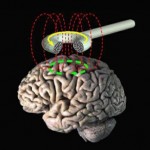My ability to recognize purposefulness is incredibly contingent on my ability to understand the natural world and to understand other minds. I have to have a decent theory of the limitations of natural processes to be able to recognize objects/processes that transcend them. Lukas’s example of pulsars is apt. Until scientists realized that there could be stars that naturally emitted radio wave bursts at regular intervals, many of them reasonably wondered if they could be a signal from an alien intelligence. After all, it looked like the kind of signal we might choose to send ourselves, given the capability.
That leads to the other big problem in investigating purposefulness. I have to be able to make a guess about what kind of purpose was intended and what kind of being intended it. After all, there’s a lot that can appear unexplainable, even when I have a reasonable grasp on the problem. Consider the sailing stones of Death Valley and Racetrack Playa (one is pictured at right). These stones, which weigh up to 80 lbs, have a tendency to move large distances without any visible source of momentum. There have been a number of theories advanced and tested, but, to my knowledge, none have been accepted as definitive.
But most people don’t hypothesize that these stones are being moved by an invisible purposeful agent, even though they look like they deviate from physical laws as understood. Why? Because it the idea of a poltergeist who solicitously, patiently nudges stones across a desert and takes no other observable actions seems nuts. We wouldn’t do it, and it’s hard to imagine any intelligent being that would. There could be a race of invisible aliens that engaged in this kind of rock shepherding the same way that some people take care of Zen gardens, but it feels unlikely.
The ‘fine-tuning’ of the Universe to support human life falls well outside the limits of my ability to conjecture about natural processes. I really, really do not understand the origins of the Big Bang well enough (despite the much-appreciated help of Simon Singh) to make any guesses about universe-budding, multiverse-worlds, etc. If there’s natural law-transcending purpose there, I’m almost certainly not going to recognize it.
In fact, the odds are decent that I’m going to have a hard time recognizing a purposeful act by any superhuman being, unless it’s making a special effort to dumb itself down to my level. Design has to occur at a scale I can recognize conceptually as well as physically. Purposefully designed artifacts or processes that are tailored to accomplish goals I can’t understand are likely to slip my understanding.
Daniel Abraham wrote “Leviathan Wept” one of my favorite science fiction stories on this topic. I’m going to spoil it slightly, but if you want to run off and order the Year’s Best Science Fiction collection in which it appeared, I applaud you heartily and I’ll meet you back at this post once you’re finished reading.
Ok, now that you’re done with the collection (wasn’t “Inappropriate Behavior” [Pat Murphy’s story told from the perspective of an autistic girl opporating a robot avatar] excellent?) here’s the brief recap of “Leviathan Wept.” Abraham reframes terrorism and war as a autoimmune disease affecting the larger, metaorganism that humans are included. An elite anti-terror military unit begins observing paradoxes and aberrations that may be an attempt from the metaorganism to communicate with humans. But the gulf in understanding may be too large to bridge.
Communication with a superhuman entity, whether God, ETs, or AI is likely to always be subject to this problem. Unless such an entity attempts to communicate with us at our level, we are unlikely to be able to understand the content of a message or even to process it as an attempt at communication. But if a superhuman entity communicates at our level, it’s hard for it to clearly demonstrate the ways in which it exceeds human understanding. Either way, our ability to understand its purpose or to recognize it as such are severely limited.
Addendum: the problem of establishing communication between beings existing at vastly different scales is why I find Christianity, with its doctrine of the Incarnation, uniquely compelling among religions.













